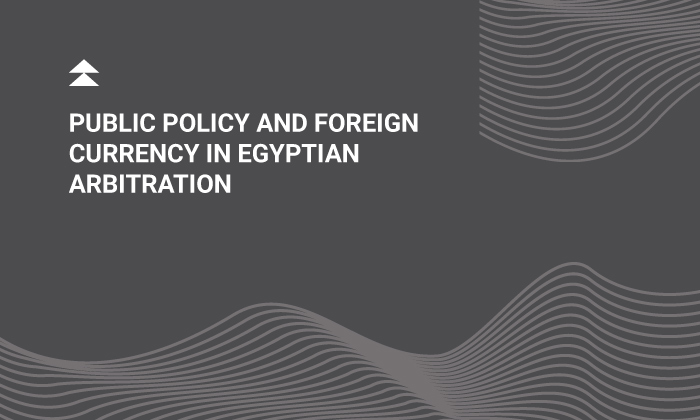Background
In a recent landmark decision, the Egyptian Court of Cassation (Cases Nos. 32779 & 32790/93J) annulled an arbitral award issued by the Cairo Regional Centre for International Commercial Arbitration (CRCICA). This was on the grounds of violation of public policy, highlighting the intersection between public policy and foreign currency reliance. The arbitral award (Case No. 1394/2020, dated 20 October 2022) had ordered the appellants to pay the respondent company USD 23,045,388 plus 5% annual interest as compensation.
The dispute arose from a Memorandum of Understanding (MoU) signed on 20 November 2007 regarding the sale of 49% of the shares of Al Mokhtabar Medical Laboratories, an Egyptian joint stock company. The purchase price was denominated in Egyptian pounds (EGP 58 million). When the sellers later sold the shares to another investor, the Saudi company initiated arbitration proceedings. They sought damages for breach of contract. The arbitral tribunal awarded damages in U.S. dollars. The Cairo Court of Appeal rejected the annulment request. However, the Court of Cassation overturned that decision. It held that the award violated Article 212(1) of Law No. 194/2020 (Banking Law). This mandates that domestic transactions be conducted in Egyptian pounds unless otherwise provided by law.
The Court’s Reasoning
“Since the appealed judgment rejected the plea of nullity despite the arbitral award ordering compensation in a currency other than the national one, it is therefore vitiated by a violation of the law and a misapplication thereof, warranting annulment.”
The Court reasoned that ordering payment in a foreign currency within Egypt contravenes the national monetary system. Thus, it offends public policy.
Critical Commentary: The Misconception of Public Policy
A particularly striking flaw in the Court’s reasoning lies in its contradictory treatment of public policy. The Court held that the arbitral award violated public policy. This was because it ordered payment in a foreign currency. Yet, paradoxically, it went on to acknowledge that the same award would have been valid had the parties expressly agreed to payment in U.S. dollars. This self-contradiction exposes a fundamental confusion between the subjective and objective dimensions of public policy. The objective dimension refers to rules that are essential to the legal order—principles such as morality or due process that parties cannot waive by private agreement.
The subjective dimension, however, relates to the parties’ autonomy and contractual freedom. By treating a purely contractual matter, the choice of payment currency, as a violation of objective public order, the Court blurred this vital distinction. This reasoning creates an illogical paradox: a payment in foreign currency is ‘contrary to public policy’ when imposed by an arbitral tribunal. Yet, it is entirely lawful when voluntarily agreed by the same parties.
Legal and Practical Implications
1. Currency Denomination ≠ Violation of Public Policy: Awards expressed in foreign currency should not be annulled if payment can be made in the equivalent value in Egyptian pounds at the applicable exchange rate.
2. Investor Confidence: The ruling risks deterring both domestic and international investors from choosing Egypt as an arbitration seat due to uncertainty about enforceability.
3. Judicial Modernization: The Court of Cassation should adopt a modern interpretation of public policy. It should be consistent with Egypt’s international obligations and the realities of global commerce.
Recommendations
1. Drafting Arbitration Claims Carefully: Counsel should ensure that monetary claims in arbitration are worded to avoid future challenges. In the final relief requested before the arbitral tribunal, it is advisable to state the claim as: ‘Payment of the awarded amount in U.S. dollars or its equivalent in Egyptian pounds at the exchange rate on the date of payment.’ This approach preserves the value of the foreign currency while avoiding potential annulment under Article 212 of the Banking Law.
2. Judicial and Legislative Clarification: Egyptian courts should adopt a consistent stance. An arbitral award expressed in a foreign currency is valid if it permits payment in the local currency equivalent. Legislative or Central Bank guidance would further enhance predictability.
3. Balancing Sovereignty and Party Autonomy: Egypt’s courts should modernize the concept of ‘public policy’ to reflect the realities of international trade. This ensures that protective economic rules do not override contractual freedom.
4. Investor Confidence: Clear jurisprudence confirming this approach would reassure investors and reinforce Egypt’s position as a regional friendly arbitration hub.
Conclusion
The annulment of the arbitral award solely because it was expressed in U.S. dollars represents a serious misapplication of public policy. It is a step backward for arbitration in Egypt. It is essential for the Court of Cassation to modernize its understanding of public policy. This ensures that technical or procedural formalities do not override substantive justice. Balancing national economic interests with contractual freedom will be key to preserving Egypt’s attractiveness as a jurisdiction for international arbitration.
Counsel’s View
This analysis reflects our firm’s position that the evolution of public policy interpretation in Egypt is vital. It is important for maintaining the country’s competitiveness as a leading arbitration seat. The distinction between mandatory state rules and private contractual choices must be drawn carefully. This is to avoid undermining investor confidence and international credibility.
This article offers a general overview of the subject matter and is not a substitute for legal advice. For guidance tailored to your specific circumstances, professional consultation is recommended.
Request a formal consultation
If you choose us to support your specific issue, please do not hesitate to contact us using Inquiries Form (link) or by sending an email to coop@youssrysaleh.com.
